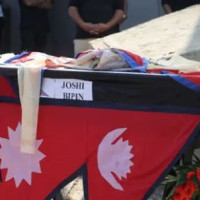- Monday, 20 October 2025
Visually impaired seek aid for safe commute
Kathmandu, Oct. 16: A disable-friendly road or footpath is something rare throughout Nepal. Individuals with disabilities often struggle to reach one place from another, either near or far.
Visually impaired people struggle the most when commuting on foot. It is a white cane that helps people with blindness to commute independently.
Every year, October 15 is dedicated to making people aware of the importance of white canes to blind individuals.
The White Cane Safety Day, which was marked this year for the 59th time since its establishment in 1964, was celebrated by organising different programmes throughout Nepal.
According to the Nepal Association of the Blind (NAB), there are over 90,000 blind individuals in the country and a majority of them are deprived of various services due to different challenges and problems.
Of them, the most common one is a lack of disable-friendly roads to use their cane and walk independently and safely.
The issue was also raised strongly during an interaction programme between the representatives of the NAB and the Kathmandu Valley Traffic Police Office (KVTPO) at the latter’s office in Ramshahpath, Kathmandu, on Sunday.
Speaking at the programme, NAB’s general secretary Shishir Khanal highlighted the difficulties faced by white cane users to commute on foot in the Kathmandu Valley.
“There are not enough footpaths. Not all the available footpaths are in good condition and have tactile paving. If there are any proper disabled-friendly footpaths, it is obstructed by normal individuals standing or selling items along the tactile paving. Many footpaths and roads have stones, broken glass, construction materials and unmanaged parking of vehicles that restrict blind individuals from walking safely with their canes,” said Khanal.
According to the Foundation for Blind Children, white canes are designed to protect their users by discovering steps, cracks in the pavement, obstacles in the path, and much more.
“By sweeping across the ground or tapping the cane in front of each footstep, a visually impaired traveller can gather more information about their surroundings. Canes are the extension of a person’s sense of touch, allowing them to feel the ground ahead of them,” the Foundation states. Blind individuals in Nepal also stated that the country lacked strict policies and laws to facilitate people with blindness.
According to the Braille Institute of America, the country’s White Cane Law states, “A totally or partially blind pedestrian who is carrying a predominately white cane (with or without a red tip), or using a guide dog, shall have the right-of-way. The driver of any vehicle approaching this pedestrian, who fails to yield the right-of-way, or to take all responsibility and necessary precautions to avoid injury to this blind pedestrian, is guilty of a misdemeanour and is punishable.”
Stakeholders stressed that vehicles should stop and drive with extreme caution after seeing a blind individual carrying a white cane along the road. They also requested vehicle operators to not honk as a blind individual would get confused.
“At a time when the infrastructures are not disabled-friendly, we seek support from individuals and authorities in person. They can at least prevent a blind individual from taking the wrong path or a footpath with obstructions. They can at least help blind individuals reach their destination safely,” said Khanal.
Responding to the concerns of the NAB, Deputy Inspector General of Police (DIGP) Poshraj Pokhrel, who is also the chief of the KVTPO, assured that the traffic police officers deployed in the Valley would prioritise helping a blind individual over others.
“Our officers will assist a blind individual at sight. We also request other stakeholders, including general citizens and public vehicle operators, to also help a blind individual commute on foot safely,” said DIGP Pokhrel.
















